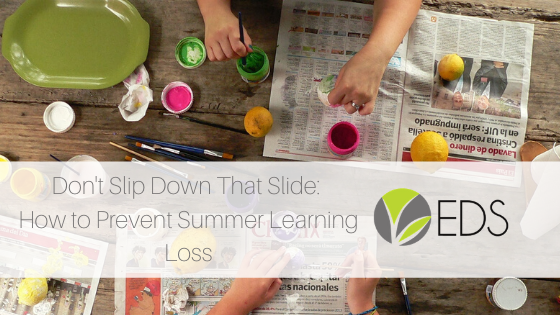Summertime is always an exciting time for kids. It’s a break from that regular school routine and time to focus on fun! Except not too much fun. While it’s important to give our children the break so they can recharge and truly retain information, there’s a phenomenon called “summer learning loss” (also called the “summer slide”). Summer learning loss happens when children slowly start to forget the things they’ve learned in the previous school months.
With the shakeup of the 2019-2020 school year due to the COVID-19 pandemic, this issue may be even more prevalent. The best way to prevent your children from slipping down that summer slide is to keep the wheels in their mind turning even during the summer. According to Oxford Learning, it only takes two to three hours of learning per week to prevent learning loss. But how should you integrate this learning? Let’s discuss fun ways you can slow the loss of knowledge this summer.
Have an at-home book club
Reading is important, and one of the best ways to keep your brain sharp. The best thing about reading is that your children can pick from a variety of genres to pique their interest. You can make it a bonding experience for the whole family by setting up a book club, where each family member has to read a book of their choice and report later to discuss.
Encourage journaling or other forms of writing
Writing is something that can be a struggle for children to get into outside of the classroom. It may be helpful to encourage your children to write for a couple minutes everyday. Whether they write something fictional, or journal about what they did today, it will help them enhance their writing skills. For older kids, you can look up writing prompts online to really hone in on their skills and creativity.
Assign a day of the week for your kids to join you in the kitchen
Cooking can really help your children grasp scientific and mathematical concepts. Plus, your children will feel grown-up and proud of themselves if they help you make dinner!
For example, you can integrate math lessons into measuring for recipes. The reactions that occur during the baking process can help your children learn science. Put on your aprons and have some fun!
Have a fun (but educational) family game night
Friday Night Game Night is a classic way to bond with your family, but you can have an educational spin too! Word games like Scrabble and Boggle enhance your children’s verbal skills and spelling, but there are some other games you might not realize can help your kids learn. For example, Uno helps younger kids get a handle on their colors and numbers, but any age can benefit from the thinking skills Uno provides. Connect-4 provides your children with thinking skills as well; they have to think ahead to pull off the win. Monopoly or Life can help them with math and money management skills.
Tour a museum or zoo virtually
Ideally, you would attend a zoo or museum physically to reap the full benefits via tour guides, but given the circumstances, virtual tours do the trick, too! Not only can you virtually tour museums and zoos, but you can also watch wildlife live feeds and give your children facts on the animal as you’re watching.
Here are some resources for other virtual field trips:
- Resource with links to many zoos, dairies, symphonies, and operas that are offering virtual tours and viewings
- Facebook page for Charlie’s Acres, a 140-animal farm offering 30-minute long virtual tours and videos of the animals
- A 360 degree view of Mars, provided by Google and NASA’s Curiosity Rover
- Link to sources of virtual museums, classes, and exhibits in Chicago, San Diego, San Francisco, and Seattle.
Ask your children to complete projects
This is a great option for older kids and teens. There are some great options that we probably all have done in school: making a popsicle bridge, creating a functioning roller coaster, or trying to create the fastest paper airplane. You can find other DIY project ideas for the family here.
Embrace your children’s interests
Summer can be a great time to really hone in on an interest. If you notice your children take a liking to one project over another, embrace that! This is especially important for teens who may still be unsure about what direction to go after high school.
Conclusion
The best thing to keep in mind is what your children are liking to do and what they’re struggling at. During the summer you can try to improve a subject that was a struggle last school year. Don’t forget that summer learning loss is an issue you want to avoid, but you don’t want to overwhelm your children with too much information.
Educating your children by playing games, doing projects, and going on tours is the perfect chance for bonding. And plus, you’re never too old to learn! Parents, you might learn something yourself.
If you’re a parent and you need some assistance with the emotional learning side of things, our Onspire Learning Management program may be a solution for you. Onspire has three different paths of curriculum: PD3: Comprehensive, Efficient, and Accountable, C3: Civility, Compassion, and Cultural, and R3: Resolve, Remediate, Restore. Visit the links provided to learn more!

